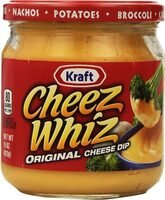Is Cheez Whiz Halal?

Cheez Whiz, a popular cheese spread produced by Kraft Foods, has been a household staple for decades. Its creamy, processed texture makes it a convenient option for sandwiches, nachos, and various recipes. However, for individuals following a halal diet, whether Cheez Whiz is halal or not is important to address. In this article, we will explore the factors that determine whether Cheez Whiz can be considered halal, examining the ingredients, the production process, and religious perspectives on processed foods like Cheez Whiz.
What is Halal?
Before diving into the specifics of Cheez Whiz, it’s important to understand what it means for a product to be halal. In Islamic dietary law, halal refers to food that is permissible to consume according to Islamic law (Sharia). Halal foods must meet certain criteria, including the source of ingredients, the processing methods, and adherence to cleanliness standards. Foods that are not halal are classified as haram, meaning forbidden.
In addition to the obvious restrictions such as avoiding pork and alcohol, the concept of halal extends to the additives, enzymes, and preservatives used in processed foods. One key area of concern is animal-based products, especially enzymes like rennet, which are often used in cheese production.
Ingredients in Cheez Whiz
Cheez Whiz is known for its processed, shelf-stable nature. It’s not exactly a traditional cheese, but a cheese-based spread that contains various additives to achieve its smooth consistency. Some common ingredients in Cheez Whiz include:
- Cheese
- Milk
- Whey
- Sodium phosphate
- Sodium Alginate
- Mustard flour
- Paprika
- Artificial colors
While many of these ingredients may seem harmless, the issue arises when we consider the source of certain ingredients, particularly enzymes like rennet, which is commonly used in cheese production.
The Issue with Rennet
Rennet is a crucial ingredient in cheese-making, as it helps coagulate milk, turning it into curds and whey. Rennet can come from various sources:
- Animal Rennet: Traditionally, rennet is sourced from the lining of the stomachs of young calves, particularly those that have not been weaned off milk. If this rennet is sourced from animals that are not slaughtered according to halal guidelines, the resulting cheese would not be halal.
- Microbial Rennet: Some cheeses use microbial rennet, which is derived from fungi or bacteria. This type of rennet is not animal-based and is considered halal.
- Vegetarian Rennet: This is plant-based and can also be deemed halal, as it avoids the issue of animal slaughter altogether.
The primary concern with Cheez Whiz is whether the rennet used in the production of its cheese component is derived from animals or if a microbial or vegetarian alternative is used. Unfortunately, Kraft does not explicitly list the source of the rennet used in Cheez Whiz on the product’s packaging, leaving consumers in a gray area.
Is Cheez Whiz Halal?
Given the ingredients and lack of clear information on the source of the rennet used in Cheez Whiz, the product is generally not considered halal. Some sources confirm that Kraft’s Cheez Whiz is not halal-certified
The lack of a halal certification or clear labeling regarding the use of microbial or vegetarian rennet further complicates the matter. Halal certification from a recognized authority would provide Muslim consumers with the necessary reassurance that the product meets Islamic dietary laws. Without such certification, consumers must rely on the company’s transparency regarding the sources of animal-based ingredients.
As of now, Kraft Cheez Whiz does not carry halal certification. While this may not be an issue for non-Muslim consumers, it presents a challenge for those who adhere strictly to halal guidelines.
Istihalah (Transformation) and Processed Foods
Another concept that arises in the discussion of whether Cheez Whiz is halal is “istihalah,” an Arabic term referring to the chemical transformation of a substance. In Islamic jurisprudence, if a haram substance undergoes a complete chemical transformation and is no longer recognizable as its original form, it can be considered halal.
For example, in some schools of thought, if an impure or forbidden ingredient is transformed in a way that its chemical properties change entirely, it could potentially be deemed permissible. Some scholars have argued that processed foods, where ingredients are broken down and altered significantly, may qualify under this principle. However, this is a matter of scholarly debate, and not all Muslims agree on this interpretation.
In the case of Cheez Whiz, the extensive processing of ingredients could be considered a form of istihalah by some scholars. However, without a definitive ruling or certification, it remains a risky choice for those adhering to halal dietary standards.
Halal Alternatives to Cheez Whiz
For those seeking halal alternatives to Cheez Whiz, there are several options available. Many brands now offer halal-certified cheese products, ensuring that they meet the strict requirements for consumption in a halal diet. When shopping for processed cheese products, look for the halal certification symbol on the packaging, or research the company’s website to verify their halal status.
Additionally, some consumers choose to make their cheese spreads at home, ensuring that all ingredients used are halal. Homemade cheese spreads can be made with halal-certified cheeses, milk, and other permissible ingredients, offering a safer and more transparent option.
Conclusion
While Cheez Whiz remains a popular choice for many consumers, its status as halal or haram is unclear due to the lack of specific information on the source of animal-based ingredients like rennet. The absence of halal certification from Kraft further complicates matters, leaving Muslim consumers uncertain about its permissibility.
For those adhering to a halal diet, it may be safer to avoid Cheez Whiz unless more information becomes available regarding its ingredients and production methods. Fortunately, numerous halal-certified alternatives on the market provide the same convenience and flavor without the concern of violating dietary laws.



